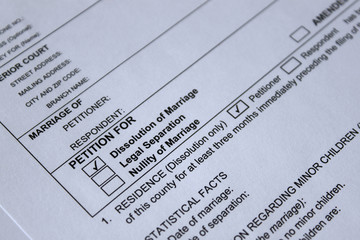If you have decided to end your marriage, understanding your legal obligations and responsibilities is crucial in ensuring that the process goes smoothly and nothing is amiss. One of the most important documents required is the divorce complaint. To learn more about this document and your legal rights, work with an experienced Union County divorce & family law attorney today.
What is a Divorce Complaint?
A divorce complaint, or Complaint for Divorce, is a legal document used to initiate divorce proceedings. The individual who files the divorce complaint is known as the plaintiff, while the recipient is referred to as the defendant.
When the plaintiff signs the official complaint, they are formally requesting that their marriage be terminated. It is the first document submitted to the court to start the divorce case. The document includes a variety of information, including the names and addresses of each spouse, date and location of the marriage, grounds for divorce, terms that the plaintiff is seeking, etc.
What is the Purpose of the Divorce Complaint?
A divorce complaint is an important document as it serves as the basis for the divorce proceeding. It outlines all relevant issues related to the divorce, including property distribution, debt allocation, child custody, child support, alimony, and other topics.
The plaintiff is required to serve the other spouse with the complaint and a summons. This informs the defendant that their spouse is initiating divorce proceedings and gives them information about what the plaintiff is requesting to get out of the divorce.
How Long Does the Defendant Have to Respond to the Complaint?
The defendant in a divorce case is required to meet certain criteria as well. One of the most important things to consider is the deadline for filing different paperwork. In New Jersey, a defendant has 35 days to respond to a Summons and Divorce Complaint, starting from the day they were served with the papers.
There are three ways to respond.
- Answer: The defendant can respond to or contest the plaintiff’s Complaint
- Answer and Counterclaim: The defendant can respond to the Complaint and state any counterclaim, like different grounds for divorce or claims against the plaintiff
- Appearance: The defendant can avoid contesting but request to be heard regarding issues like property distribution, alimony, child custody, and more
It is a defendant’s right to be notified of the plaintiff’s intention to file for divorce, but they must abide by the state’s laws, particularly surrounding the deadline to file a response. If the defendant fails to respond, the court has the authority to issue a default divorce in favor of the plaintiff.
It is crucial that you understand your legal rights and responsibilities during this time to ensure you protect yourself and that the divorce is processed with ease. Work with an experienced attorney for legal advice and representation during your case.



